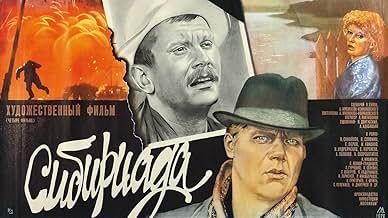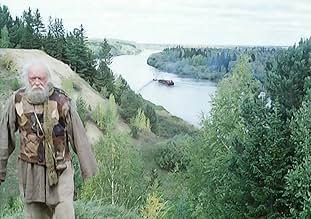Sibiriada
- 1979
- 4h 35m
ÉVALUATION IMDb
7,9/10
2,4 k
MA NOTE
Ajouter une intrigue dans votre langueIn the Siberian wilderness in the village of Yelan, two families live, who have long been at war with each other: the «kulaks» of Solomina and the «poor people» of Ustyuzhanina.In the Siberian wilderness in the village of Yelan, two families live, who have long been at war with each other: the «kulaks» of Solomina and the «poor people» of Ustyuzhanina.In the Siberian wilderness in the village of Yelan, two families live, who have long been at war with each other: the «kulaks» of Solomina and the «poor people» of Ustyuzhanina.
- Prix
- 2 victoires et 2 nominations au total
Histoire
Le saviez-vous
- AnecdotesLongest film to be in competition for the Palme d'Or.
- GaffesThe boom mic is visible for less than a second in the top left corner at roughly 1:29:11, when Alexei is talking to the elder grandfather, and the grandfather stands up and begins chanting at him.
- Autres versionsOriginally released in the United States in a 190 minute version.
- ConnexionsEdited from Triumph des Willens (1935)
Commentaire en vedette
Inexplicably this is compared to "Doctor Zhivago," I suppose because there are Russian revolutionaries. Egad. The films couldn't be more different.
This is inspired by "2001." Equally inexplicably, "Solaris" is called the Russian 2001 because. Heck, because it has space hardware. Jees.
The structure of "2001" is its reason to be, a fight among three narrative perspectives. We never know who wins: the human, machine or divine. Each is presented in a way that could be interpreted to subsume the others, and we are never grounded. Its sublime, each level above the other in a sort of Escher narrative.
This is the same, very deliberately so. We have the same three: we have the human story of sex, love community and how that embraces everything, Miss Marplewise. We have the "machine" or the revolution and its apparatus, some figurative and some literal. And we have the mystical energy and laws of nature, which are deliberate, clear, pervasive here.
(If there is something particularly skillful in this project cinematically, it is how this mystical mist pervades.)
Its not at all as deft in the balance as Kubric's masterpiece. But you can see the three climbing over each other, and the standoff presented at the end.
Its a long slog, and you'll have to wade through overly optimistic celebrations of revolutionary purpose. But its rewarding in a sort of Polish (meaning dreamy) way.
On a second viewing, I have to remark on how the fundamental nature of this is different from most else that I watch.
I'm particularly sensitive to the fact that most every element that I see in every film project is a matter of market forces. An artist can modulate within that pull, but never really escape the sender-receiver dynamic. This film differs in the way that some monumental architecture does from what surrounds it.
In the soviet system, you pay your dues and prove that you are a worthy artist. That means of course that you have to satisfy the artistic bureaucracy, the nature of which one can only imagine. But once you achieve some level of power, you become a dilettante, with amazing reach. Everything we see here is because it was envisioned to be so, quite apart from what we normally have to deal with in the "free" world.
Its the inversion that is striking. This film really is perfect in many ways. You can see that every frame and nuance is the way the filmmaker wants it regardless of whether he thinks people care. I didn't care much, because the thing is as soulless as most other Soviet art. But its very clean, and big and sentimental.
And its different, and that's a welcome shower.
Ted's Evaluation -- 3 of 3: Worth watching.
This is inspired by "2001." Equally inexplicably, "Solaris" is called the Russian 2001 because. Heck, because it has space hardware. Jees.
The structure of "2001" is its reason to be, a fight among three narrative perspectives. We never know who wins: the human, machine or divine. Each is presented in a way that could be interpreted to subsume the others, and we are never grounded. Its sublime, each level above the other in a sort of Escher narrative.
This is the same, very deliberately so. We have the same three: we have the human story of sex, love community and how that embraces everything, Miss Marplewise. We have the "machine" or the revolution and its apparatus, some figurative and some literal. And we have the mystical energy and laws of nature, which are deliberate, clear, pervasive here.
(If there is something particularly skillful in this project cinematically, it is how this mystical mist pervades.)
Its not at all as deft in the balance as Kubric's masterpiece. But you can see the three climbing over each other, and the standoff presented at the end.
Its a long slog, and you'll have to wade through overly optimistic celebrations of revolutionary purpose. But its rewarding in a sort of Polish (meaning dreamy) way.
On a second viewing, I have to remark on how the fundamental nature of this is different from most else that I watch.
I'm particularly sensitive to the fact that most every element that I see in every film project is a matter of market forces. An artist can modulate within that pull, but never really escape the sender-receiver dynamic. This film differs in the way that some monumental architecture does from what surrounds it.
In the soviet system, you pay your dues and prove that you are a worthy artist. That means of course that you have to satisfy the artistic bureaucracy, the nature of which one can only imagine. But once you achieve some level of power, you become a dilettante, with amazing reach. Everything we see here is because it was envisioned to be so, quite apart from what we normally have to deal with in the "free" world.
Its the inversion that is striking. This film really is perfect in many ways. You can see that every frame and nuance is the way the filmmaker wants it regardless of whether he thinks people care. I didn't care much, because the thing is as soulless as most other Soviet art. But its very clean, and big and sentimental.
And its different, and that's a welcome shower.
Ted's Evaluation -- 3 of 3: Worth watching.
- tedg
- 15 janv. 2008
- Lien permanent
Meilleurs choix
Connectez-vous pour évaluer et surveiller les recommandations personnalisées
- How long is Siberiade?Propulsé par Alexa
Détails
Box-office
- Brut – à l'échelle mondiale
- 1 753 $ US
- Durée4 heures 35 minutes
- Couleur
- Rapport de forme
- 1.37 : 1
Contribuer à cette page
Suggérer une modification ou ajouter du contenu manquant






































